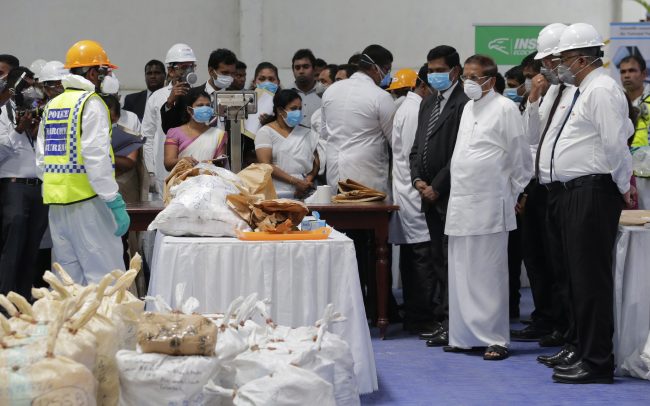Sri Lankan authorities have reportedly begun interviewing 47 candidates for two positions as hangmen, even as rights groups slammed the country’s move to bring back the death penalty after a decades-long moratorium.

The island nation hasn’t executed a criminal in 43 years, but President Maithripala Sirisena revealed last year that hangings would be brought back as part of a renewed war on drugs — Sirisena is a noted admirer of Philippine President Rodrigo Duterte.

The country began advertising the grim career opportunity in newspapers in February. The ad called for applicants with “excellent moral character” and “mental strength.”
In March, the state-run Daily News reported that 102 applications had been received for the two available positions. An American national was among the applicants, even though the ad said Sri Lankans only need apply.
Now, AFP reports that the candidates have been whittled down to 47.
But there’s a catch — with no executions having been carried out since 1976, the chosen candidates will need to be sent abroad so they can learn the ropes from seasoned hangmen, an official told AFP.
READ MORE: Despite drug war that killed thousands, Rodrigo Duterte ‘jokes’ about smoking marijuana

Get daily National news
Rights groups condemned the imminent restoration of the death penalty, saying that executions won’t make a dent in drug-related crime and that they bring the risk of innocent people being killed.
“There is no evidence that implementing the death penalty will end drug-related crime. Executions are never a solution,” said Biraj Patnaik, South Asia director at Amnesty International.
“Indeed, they may result in people being put to death following unfair trials. The death penalty is also a punishment that disproportionately affects people from less advantaged socio-economic backgrounds.”
Patnaik said that torture and forced confessions are a routine occurrence in Sri Lanka’s justice system, meaning there’s a high likelihood that convicts will be put to death following unfair trials.
“No criminal justice system is capable of deciding fairly who should live or who should die,” he said.
READ MORE: California Gov. Gavin Newsom to place moratorium on the state’s death penalty, source says
Human Rights Watch said the fact that Sirisena’s push for the death penalty was inspired by Duterte’s “murderous” drug war makes it all the more clear that the death penalty has no place under international law.
“President Sirisena’s decision to restore the death penalty because he was inspired by the Philippines’ murderous ‘drug war’ may be the worst possible justification and would violate international law,” said Meenakshi Ganguly, South Asia director at Human Rights Watch.
WATCH: Duterte calls Trudeau’s criticism of extra-judicial killings a ‘personal and official insult’

Human Rights Watch noted several studies that found no evidence that the death penalty deters criminals, even for crimes like murder.
“The Sri Lankan government should publicly recommit to its moratorium on the use of the death penalty with a view to permanently abolishing the practice,” Ganguly said.
“Executions, whether imposed by a judge or carried out unlawfully by the police, are not the way to address drug offences.”
On Sunday, Sirisena said a date had been set for the death penalty’s comeback, although he didn’t reveal the date, The Hindu reported.
Nearly 1,300 people are on death row in Sri Lanka, according to Human Rights Watch, although the state-run Daily News put the figure at 400.
The country’s Ministry of Justice has completed “administrative procedures” for the execution of five drug offenders, the Daily News reported.
— With files from Reuters








Comments
Comments closed.
Due to the sensitive and/or legal subject matter of some of the content on globalnews.ca, we reserve the ability to disable comments from time to time.
Please see our Commenting Policy for more.